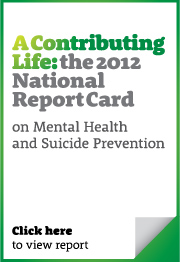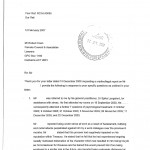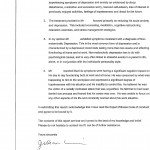 “… people with mental health problems want the same thing as everyone else. Even the disadvantaged should be able to lead a contributing life. This can mean many things. It can mean a fulfilling life enriched with close connections to family and friends, good health and wellbeing to allow those connections to be enjoyed, having something to do each day that provides meaning and purpose – whether it be a job, supporting others or volunteering, and a home to live in, free from financial stress and uncertainty.
“… people with mental health problems want the same thing as everyone else. Even the disadvantaged should be able to lead a contributing life. This can mean many things. It can mean a fulfilling life enriched with close connections to family and friends, good health and wellbeing to allow those connections to be enjoyed, having something to do each day that provides meaning and purpose – whether it be a job, supporting others or volunteering, and a home to live in, free from financial stress and uncertainty.
Australians do want to talk about mental health and suicide and they want to know what is best to do, that there is someone to talk to and somewhere to go for help, whether it’s for personal reasons, family, fairness and social justice or broader economic and social reasons.”
Professor Allan Fels, National Report Card
I’ve had a post planned for Blak and Black for a couple of weeks now, about mental health, my thoughts on the publication of Australia’s first National Report Card on Mental Wellbeing by the National Mental Health Commission. But like most of the rest of this world at this mad time of year, I’ve been caught up in the business generated by the Yuletide in preparation for Australia’s annual migration to an overflowing table of food, burgeoning tree of gifts and rash of speeding and drunk drivers. Simultaneously, Bakchos has been buried in the business of meeting the deadline for his PhD and managing the physical damage from his attack last Easter.
Delayed as it may be, it is perhaps timely to consider the National Report Card on Christmas Day, for it is a time of year that provokes the most heart rending and terrible attacks of mental ill health on a mass scale that leaves many a casualty department burgeoning. The family clashes, the distraught man estranged from his children on Christmas Day, the drunken mother not coping with the weight of financial strain and the lack of gifts; Christmas for many, is the saddest and most painful day of the year.
The proportion of Indigenous Australians living in the lowest socio-economic bracket far outweighs that of any other cultural or ethic group in Australia. With that burden, comes the increased risk of intimidation by police who variably are under-resourced or do not understand the impacts of mental ill health and how to manage those affected. Compounding the problem is a lack of access to legal representation because of tight finances and an over-burdened legal aid system. The result is poorer outcomes via the justice system and a significantly higher rate of incarceration. The long term impacts of so many indigenous people being marked as offenders is stigmatization of the entire indigenous community.
Identified in the National Report Card are four areas requiring attention if any real change in the state of mental health for the overall population in to be seen. First on that list in that:
“Mental health must be a high national priority for all governments and the community”
and that:
“The mental health and wellbeing of Aboriginal and Torres Strait Islander peoples needs to be included as one of our national priorities”.
The mental health of Australia’s Indigenous people is the feature in this first Report Card.
Recommendation 5 in the report requires the inclusion of the improvement of mental health and welling of Aboriginal Australians in Closing the Cap targets, which states that:
“Up to 15 percent of the 10 year life expectancy gap compared to non-Indigenous Australians has been attributed to mental health conditions.”
The causes are familial disharmony, depression, acts of self harm, suicide, increased rates of smoking and alcoholism, obesity and premature death due to the effects of prolonged physical ill health.
The whole point of the report is to begin to create a strategy by which every Australian can lead A Contributing Life. Indeed, that is the catch-cry of the report. The report also makes it the responsibility of those in government to ensure that mental health is a priority; it makes it the business of the Prime Minister, Premiers and Chief Ministers. On that point Blak and Black could not agree more, for it was the inactions and omissions of the then Australian Capital Territory’s Chief Minister Jon Stanhope, that allowed Pat, the nation’s first Indigenous Commissioner for Revenue, to be pilloried by the ACT Department of Treasury and the Australian Federal Police. Similarly, the former Commissioner for ACT Revenue was denied his rights by the federally instituted Australian Human Rights and Equal Opportunity Commission (now the Australian Human Rights Commission) when they refused to review his case of intimidation and harassment at the hands of his racial oppressors.


As documented by clinical psychologist Dr. Jillian Fleming, Pat suffered a non-clinical depression as a direct result of the bullying and harassment he has suffered through his work. His disturbed sleep patterns, loss of interest in previously enjoyed activities, sense of hopelessness and poor self-esteem are all documented and contribute to Pat’s sense of NOT being able to lead A Contributing Life. His ability to function as a husband and father were directly affected as a result of his racial abuse and broke down a proud Indigenous man.
Pat considered that he had been denied procedural fairness in his dealings with the ACT Department of Treasury. His faith in the system was eroded, because the system failed him. Take Pat’s experience and extrapolate that the other indigenous men and women, abused for their skin colour or simply the aboriginal flag behind their desk, a sign of pride in their heritage no different to me placing a little Irish tri-colour in my pen holder. Pat’s experience is no different and in fact, shows that leading A Contributing Life requires our leaders to do what leaders should do – enforce procedural fairness to ensure that discrimination of any type be it racism, sexism or xenophobia are not tolerated. This country fails our first Australians at almost every turn, stripping them of the rights we have supposedly given them under a Western system that has been imposed upon them against their will. When they attempt to adjust to the majority rules through study, educational advancement and following the legal processes, they are rebuffed and ignored. When they rebel, they are charged without any recourse to the circumstances that brought them to their rebellion in the first place. And when they finally meet the culmination of all the injustices face-to-face, their mental health suffers.
If we want to improve the overall health of Australia’s first people we must first, as a nation, address the racial divide in this country’s law enforcement and legal system and make people accountable for the racial abuse they heap upon others. The most effective way we can facilitate our Indigenous countrymen and women to live A Contributing Life is through acknowledgement not only of their suffering, but real measures to dismantle racism and through building a truly supportive and equal community.
To all the readers of Blak and Black, we wish you the blessing of A Contributing Life for the Yuletide, facilitated by a nation that will put into practice what it says it wants to achieve, rather than using a National Report Card such as this as a veneer behind which to push a lack of interest or commitment to change.



Stop fucking winging about ancient history nobody cares. Move on like the good house nigger you really are. Surely the fat slut your with now wants an end to all of this. [Name removed by moderator, indicating ACT Department of Treasury employee, known on Blak and Black as the Inquisitor] while I agree is stupid and useless has managed to fuck you and your family up, what does that say about you?
The mental health is essential for the normal life of each of us. Some of the violations in this area can have a negative impact on our emotional state.